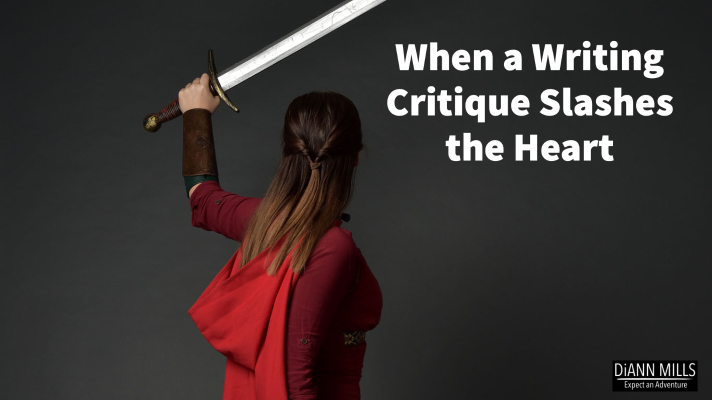By DiAnn Mills @DiAnnMills
We writers are a passionate, emotional group. While these traits help us create beautifully worded fiction and non-fiction, nothing slashes the heart deeper than a harsh critique of our work.
We might catch ourselves reading a harsh critique and thinking:
- “Even an idiot would get this.”
- “What? You’ve got to be kidding?”
- “Obviously, my style doesn’t suit you. Too bad. You’re missing out.”
Don’t get all self-righteous on me. We’ve all thought and said the above. Hopefully, we didn’t contact the person and blast him/her. We all learn from our mistakes.
Never hurts to be reminded what we post online, stays online.
Not every person who reads our manuscripts feels the same way. We are diverse people with opinions, views, and ideas. Once a writer understands the freedom of perspective, we are also free to write our brand and what is in our heart about the subject.
The only attitude we can project is the reader is always right—even when the person isn’t.
How do we handle those anger-filled, bitter, and hurtful comments?
Below are a few ideas that will help us maintain our professionalism with poise and respect for ourselves and the person who made the blunt statement.
- Know the difference between a critique and a criticism: Critique: an analysis of a literary work. Criticism: the disapproval of a literary work based on the person’s interpretation or regard of the contents’ faults or errors.
- The criticism isn’t about you personally but what has been written.
- Don’t respond to the critique in the heat of the moment. Give yourself time to process. Don’t get involved in an argument.
- If the review is vicious or has insulted your integrity, ignore it. Delete if possible.
- If the review simply hurt our feelings, be gracious and thank the person for their feedback.
- Read the assessment carefully. Are any of the comments valuable? Are changes needed if not in this piece but in the next? Is this an opportunity to grow as a writer?
- Consider seeking guidance from professionals in the publishing industry whom you respect.
- In some situations, an offer to refund the person’s money may be in order, but be careful in choosing that alternative.
- Refuse to quit!
Honestly, I choose not to read my reviews. If they’re good, I’m afraid I’ll get a swelled head. If they’re bad, I’ll cry for six months. I’m confident my editor will let me know if I need to be aware of a pitfall or celebrate a triumph.
What is your best method of handling a harsh critique?



Comments 27
Thanks for this reminder, Diane! I do two things when I read critiques. First, after some years now of reading news articles to prep for my intercessory prayer group, I have learned to capture the facts and skim past the adjectives; the adjectives convey personal judgment about the facts and are generally not objective. And the second thing I do is, before I even begin to read the critique, I have the mindset that if this reader had this response, it is guaranteed that others will too. If my goal is not to simply get my message out, but rather to reach people with that message, then it behooves me to consider how I can massage the text to better reach even my most cantankerous critics. I am totally blindsided at times by some comments; it is evident that our brains do not all work the same way! But if I can see my work through the eyes of the critique, I generally find that my work becomes even stronger and deeper in the process of addressing it.
Diana, thank you for sharing your wisdom!
Hi DiAnn! Just when I think I’ve developed a tough skin after all these years, a slight criticism can still send me reeling. Your comments were spot on for coping with critiques as the recipient. What’s good about getting criticized is that it heightens my awareness of how my own offhanded comments can be damaging to others. By suppressing that critical spirit (and I think there’s a special demon who afflicts us with it) in favor of making more efforts to issue praise, the outcome is a lot happier for us and others. On that note…I just posted a positive review for your book, A Woman Called Sage, on Amazon. I enjoyed it very much and wanted to tell your readers! Maybe it will serve as a little “Bactine” on your heart if it’s feeling a bit ouchie….
Great article. Love the idea that good reviews can swell the head as much as bad reviews can throw you off your game. Seeking a professional is also a great suggestion, helps in keeping a professional vs emotional mind set.
Thanks, David. My goal is to be an oreo cookie when I critique: this is excellent, this is a suggestion for improvement, and end with a layer of chocolate encouragement.
My sister always tells me authors with no bad reviews aren’t growing their audience. I know it sounds odd, but she’s of the opinion that if new people are reading an author’s work, not everyone is going to like it. But you’re also attracting other new readers that do.
Growth is painful at times.
Terri, your sister is right. Look at incredible authors, and you find bad reviews. It’s a fact of life – the more we improve our writing and reach new readers, the more some of those readers will be hypocritical.
DiAnn, you’re the second author I’ve heard recently say that she doesn’t read reviews of her books. And she was quite forceful with the advice not to.
Tim, my editors and my husband read them, but honestly I don’t want to know.
Criticism is rejection. I’ve received rejection in many ways. I read every word then ignore it for a couple of days. I then read the words again. If there’s something helpful, I make a note of it and reject the rest as being from someone who hadn’t learned how to critique. When my husband retired and we moved back to these NC mountains where we belong, I wanted to wallpaper one wall of our den with my rejections. He didn’t think that was a good idea. Weird man!
Peggy, LOL maybe wallpapering an outhouse!
Great suggestions, DiAnn!
Richard, Glad it helped!
Tim, so sorry!
Love it!! DiAnn
Some of critique comments can be brutal
Shirley, absolutely. And ugly!
Thank you for this article DiAnn. I actually thought of writing one titled “Our job is to Critique not Criticize.” My theme; A critique is like a goad to get you going in the write (right) direction but a severe criticism can wound a heart and can put to death a great book and author.
I’m with Edwina—all so helpful but #9 is crucial!! Thank you for these!
Yes! We can’t quit.
Good advice. Hurtful words can stay with us a long time. I try to remember, hurt people hurt people. 🙂
Thanks, Debbie, hurtful words are why I don’t read reviews.
What about having a close friend read them and the friend can honestly assess the ones who matter and toss out the others?
Judith, that’s an excellent solution.
I love these ideas! Especially #9 🙂
Edwina, yep, #9 is a real pain.
Hurtful critiques are just that, hurtful. I received one several years ago that blatantly slammed me. I cried. However, I sent the person, a professional, a thank you note for their honest review, and I was nice about it. I did send a copy of it to my agent, and she admitted it was unprofessional and for me to ignore it. I still remember those crushing comments, but I haven’t let them stop me. Learn, press in, and move forward. It doesn’t pay to be rude. We can’t please everyone.
Loretta, I agree critiques can be mean. Unprofessional. Ignore them and pray for whoever said or wrote this.